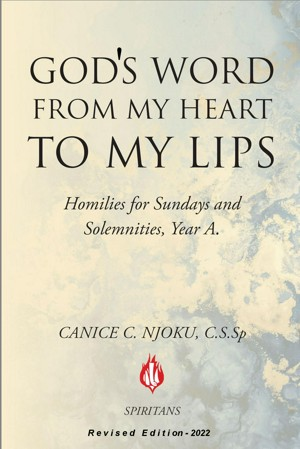Homily For The Second Sunday Of Ordinary Time, Year A
Here I Am, Lord! I Come to Do Your Will
Readings: 1st: Is 49:3. 5-6; Ps:39; 2nd: I Cor 1:1-3; Gos: Jn 1:29-34
This brief reflection was written by Fr. Njoku Canice Chukwuemeka, C.S.Sp. He is a Catholic Priest and a member of the Congregation of the Holy Spirit (Spiritans). He is a missionary in Puerto Rico. He is the Parish Priest of Parroquia la Resurrección del Senor, Canóvanas, and the Major Superior of the Congregation of the Holy Spirit (Spiritans), Circumscription of Puerto Rico and the Dominican Republic. He was the chancellor of the Diocese of Fajardo Humacao, Puerto Rico. Fr. Canice is a member of the Academy of Homiletics. For more details and comments contact him at: canice_c_njoku@yahoo.com, or canicechukwuemeka@gmail.com.
(https://orcid.org/0000-0002-8452-8392)
Today is the second Sunday of Ordinary Time, Year A. On this Sunday, the Church presents to us through the prophetic insights of Isaiah and John the Baptist the: “Agnus Dei, qui tollit peccata mundi (Lamb of God who takes away the sins of the world).” One very remarkable lesson that the Church wants us to learn from this Sunday’s readings and reflection is that the Lamb of God was more than a “mere servant.” He is a son who obediently fulfilled the will of the Father.

Available now on
Smashwords: https://www.smashwords.com/books/view/1179451
Amazon: https://www.amazon.com/dp/B094YSGTZF
In the first reading from Isaiah, God honored his servant and sealed this honor with a promise and mission: “I will make you a light to the nations.” The purpose of this promise is: “So that my salvation may reach the ends of the earth!” There are three basic suppositions about this promise and mission of God to his servant. The first is that His servant is a trusted one. Second, the servant accepted the message. Third, he will not keep this salvation to himself. Instead, he will take it to others.
In the second reading, Paul affirms his call to be an apostle. He equally proves that he obediently did God’s will. Also, he highlights another vital element of doing God’s will. That is, living a saintly life. One of our greatest missions on earth is to live holy lives. By so doing, we speak more volumes to those we try to evangelize. It is the will of God for us to be holy because he says to us: “Be Holy for I the Lord your God am holy” (1Pet 1, 13-16).
In today’s gospel, John the Baptist identifies and vividly presents the Saviour to the world. By this act, John has completed his mission and the will of God. It was for this reason that he was called to be a prophet. He has obediently accomplished his mission. Therefore, John is a perfect example of how we ought to approach our call and the will of God for us. All we need to do is to accept it, and the Holy Spirit will confirm our efforts.

When Jesus appeared, why did people not recognize him? Were they physically blind? No! Instead, they suffered from “spiritual blindness.” This prevented them from recognizing the Saviour they had waited so long to receive. It took the combination of an anointed prophet and the testimony of the Holy Spirit to identify him. The only difference that the presence of Jesus Christ will make in the life of the spiritually blind is our testimonies. Hence it is our mission to present Christ to others as John did: “Behold the Lamb of God who takes away the sins of the world.” Both Christ and John the Baptist have played their roles as far as doing the will of God is concerned. So, we have to continue that same mission.
Finally, to do God’s will perfectly, we must be in tune with the Holy Spirit. God will supply the grace that we need to do his will. The Holy Spirit will give us the power and strength we need to fulfill our mission. If we remain docile to the Holy Spirit as John the Baptist was, he will reveal all we need to know. He will teach us the best way to carry out the mission. So, let us say with the psalmist: “Here I am, Lord! I come to do your Will.”
Peace be with you!
Maranatha!
Comments
Post a Comment